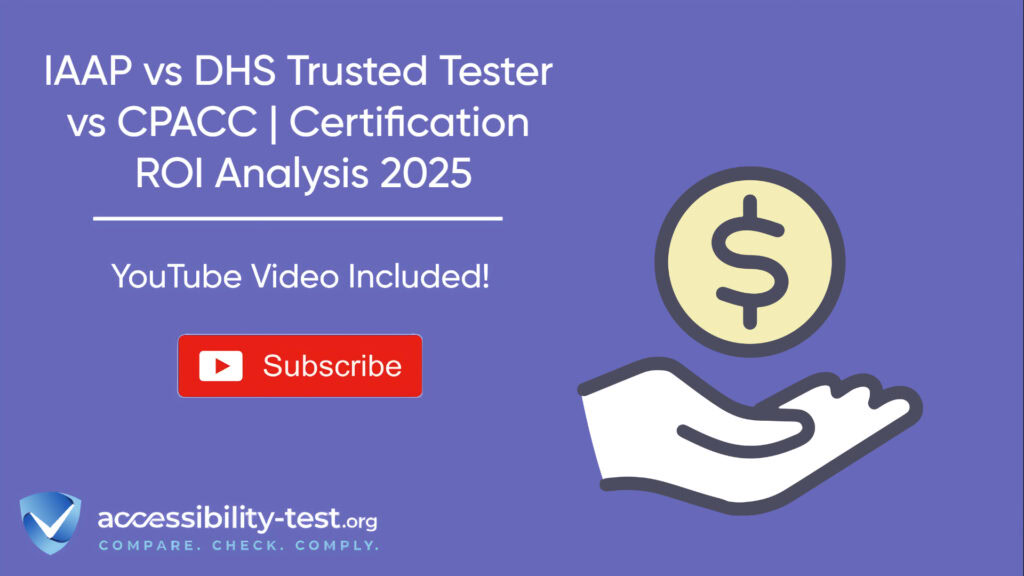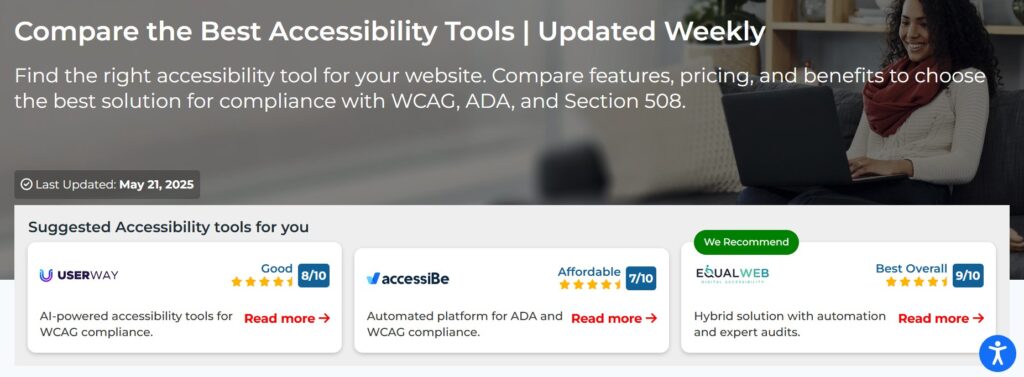
IAAP vs DHS Trusted Tester vs CPACC | Accessibility Certification ROI Analysis 2025
Professional accessibility certifications have become essential career differentiators as organizations face increasing legal pressure and market demands for inclusive digital experiences. Three primary certification paths dominate the field: the International Association of Accessibility Professionals (IAAP) CPACC and WAS certifications, and the Department of Homeland Security (DHS) Trusted Tester program. This analysis examines the return on investment for each certification, comparing costs, career advancement potential, industry recognition, and practical skill development to help professionals make informed decisions about their accessibility education investments.
The Growing Value of Accessibility Certifications
Accessibility professionals face a unique challenge in today’s market. While demand for their skills continues rising, the field lacks standardized educational pathways found in other tech disciplines. Certifications fill this gap by providing measurable proof of competency and establishing professional credibility.
The accessibility certification market has matured significantly since 2020. Organizations now actively seek certified professionals when hiring, and many include certification requirements in job descriptions. This shift reflects growing awareness that accessibility requires specialized knowledge that can’t be learned through traditional web development or design training alone.
Recent surveys show that 91% of CPACC certificants felt that exam preparation helped them discover accessibility aspects they weren’t familiar with, while 76% gained authority on accessibility matters within their organizations. These statistics highlight how certifications create both personal knowledge growth and professional recognition benefits.
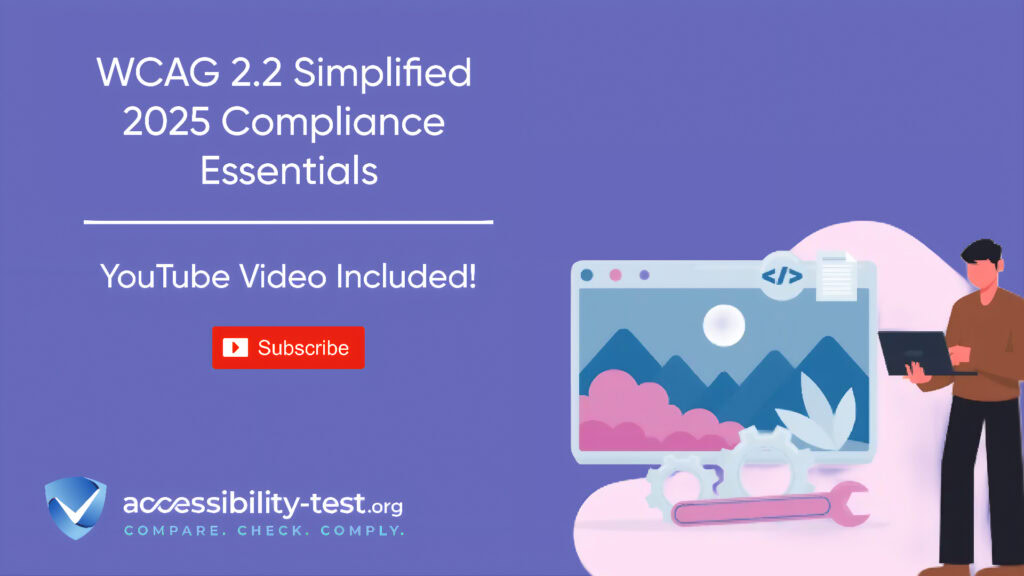
CPACC Certification | Foundation-Level Investment
The Certified Professional in Accessibility Core Competencies represents IAAP’s entry-level certification. Designed for professionals who manage or support accessibility initiatives without directly handling technical implementation, CPACC covers broad, cross-disciplinary knowledge areas.
Cost Structure and Financial Investment
CPACC certification costs vary significantly based on membership status. IAAP members pay $385 for their first attempt, while non-members face a $485 fee. The organization offers reduced rates of $170 for people from emerging and developing economies, making the certification more accessible globally.
Additional costs include IAAP membership at $200 annually and potential study materials. The official IAAP preparation course costs $195 and provides one year of access. Some professionals also invest in third-party preparation materials, such as the Deque course priced at $45, which includes practice quizzes.
Retake fees add another financial consideration. If candidates don’t pass on their first attempt, they face additional costs of $255 for IAAP members or $315 for non-members. This creates pressure to invest adequately in preparation materials upfront.
Time Investment and Preparation Requirements
Most professionals spend 6-8 weeks preparing for CPACC, studying several hours daily. The exam requires theoretical knowledge rather than hands-on coding skills, making it accessible to non-technical professionals. However, the broad scope means candidates must study disability types, assistive technologies, legal requirements, and management strategies.
The preparation process involves reading IAAP’s Body of Knowledge document and referenced materials. Many candidates report that passing the exam requires detailed review of these documents plus additional research into specific topics. Unlike technical certifications that focus on specific tools or programming languages, CPACC demands understanding of accessibility across multiple disciplines.
Career Impact and Professional Recognition
CPACC certification creates measurable career benefits for many professionals. Testimonials indicate that certified individuals gain recognition as accessibility experts within their organizations, with colleagues seeking their guidance on accessibility challenges. This expertise positioning often leads to increased responsibilities and leadership opportunities.
Job market data shows CPACC certification particularly benefits professionals in project management, UX research, and digital strategy roles. The certification doesn’t require coding experience, making it suitable for professionals who need accessibility knowledge but won’t personally perform technical implementation work.
Organizations increasingly value CPACC certification when hiring. University programs report that certified staff members establish leadership roles in their departments for accessibility matters, creating career advancement pathways that didn’t exist before certification.
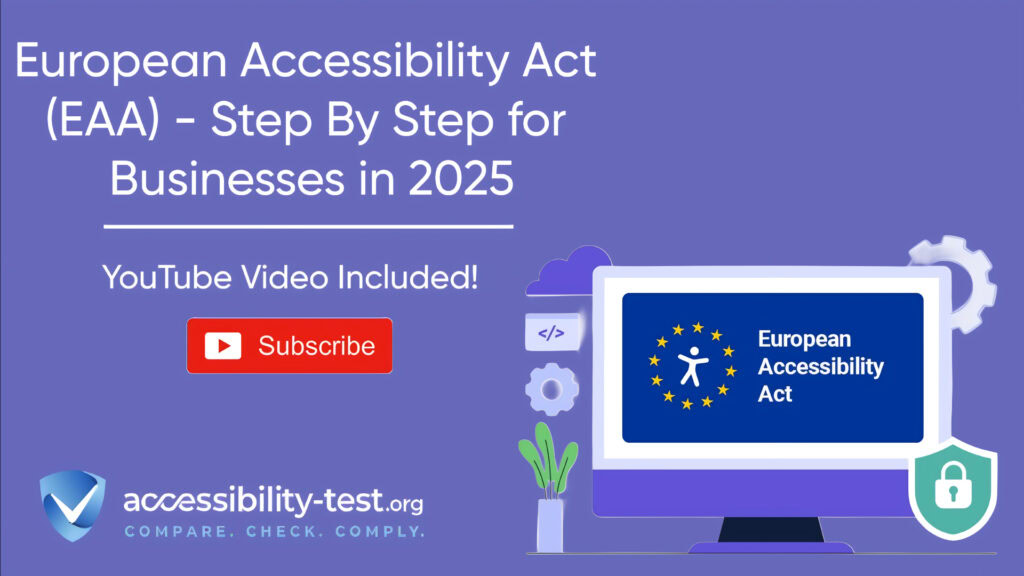
DHS Trusted Tester | Maximum ROI Through Free Training
The Department of Homeland Security Trusted Tester program offers a unique value proposition in the certification market: completely free training and certification focused on practical testing skills.
Zero-Cost Advantage
Unlike IAAP certifications, DHS Trusted Tester requires no financial investment beyond time. The training materials, courseware, and certification exam are provided free of charge. This removes financial barriers that might prevent professionals from pursuing accessibility education, particularly those early in their careers or working for organizations with limited training budgets.
The free model creates exceptional ROI potential. Professionals can gain recognized certification and practical skills without any monetary investment, making career advancement accessible regardless of personal financial situation.
Intensive Training Requirements
DHS Trusted Tester demands significant time commitment. First-time certification typically requires 40-80 hours of study, while recertification takes 40-60 hours. The program consists of five courses covering Section 508 fundamentals, testing tool installation, standards knowledge, practical training, and final certification.
The training emphasizes hands-on experience with real accessibility testing scenarios. Both practice and final exams require candidates to identify accessibility issues on actual web pages, providing practical skills that translate directly to job responsibilities. This practical focus differentiates Trusted Tester from more theoretical certification programs.
Professional Recognition and Career Benefits
Trusted Tester certification carries strong recognition within government and contractor organizations. Many professionals report landing jobs specifically because of their Trusted Tester credentials. The certification demonstrates practical testing abilities that employers value highly.
Reddit discussions among accessibility professionals consistently recommend pursuing Trusted Tester before other certifications due to its practical nature and cost-effectiveness. Many describe it as providing solid background in Section 508 requirements and hands-on experience finding accessibility issues.
The certification particularly benefits professionals seeking roles in accessibility auditing, QA testing, or government contract work. Organizations working with federal agencies often prefer or require Trusted Tester certification for team members performing accessibility testing.
Certification Logistics and Flexibility
The exam structure provides reasonable flexibility for working professionals. Candidates receive 10 days to open the exam after registration, then have 3 days to complete it once started. This timeframe allows professionals to schedule testing around work responsibilities.
Unlike some certification programs with strict expiration dates, Trusted Tester certification doesn’t expire, providing long-term value without recurring fees. However, candidates must log in every 30 days during training to prevent account lockout.
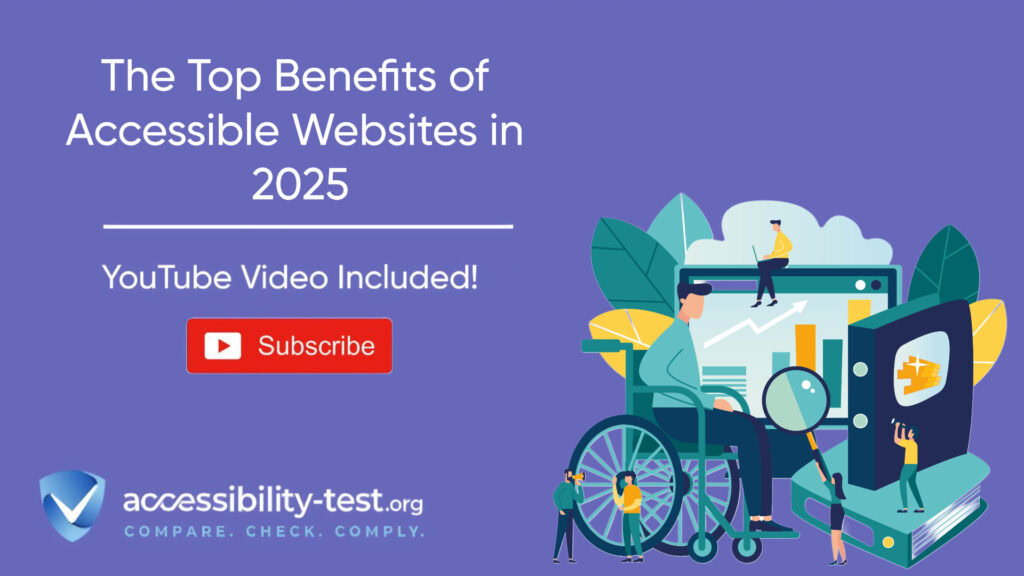
WAS Certification | Technical Expertise Investment
The Web Accessibility Specialist certification represents IAAP’s advanced technical certification, designed for professionals who directly implement accessibility solutions through coding and testing.
Advanced Cost Structure
WAS certification costs $385 for IAAP members and $485 for non-members, matching CPACC pricing. However, the certification requires three years of professional experience before candidates can even apply, making it a mid-career investment rather than entry-level option.
Retake fees mirror CPACC at $270 for members and $330 for non-members. The higher stakes and experience requirements mean most candidates invest heavily in preparation materials and training before attempting the exam.
Technical Skill Development
WAS preparation requires hands-on coding knowledge including HTML, CSS, ARIA, and JavaScript for accessibility implementation. Candidates must learn to use screen readers, keyboard navigation, and automated testing tools like axe DevTools. The curriculum also covers conducting accessibility audits and identifying WCAG compliance issues.
This technical focus makes WAS particularly valuable for developers, QA testers, and accessibility auditors who need to demonstrate practical implementation skills. The certification validates abilities that directly translate to daily job responsibilities in technical roles.
Career Advancement for Technical Professionals
WAS certification opens doors to web accessibility engineer, accessibility QA tester, and digital accessibility auditor positions. These roles typically command higher salaries than non-technical accessibility positions, making the certification investment worthwhile for technical professionals.
Hiring managers particularly value WAS certification because it demonstrates both theoretical knowledge and practical implementation skills. The three-year experience requirement ensures certified professionals have real-world context for applying their knowledge effectively.
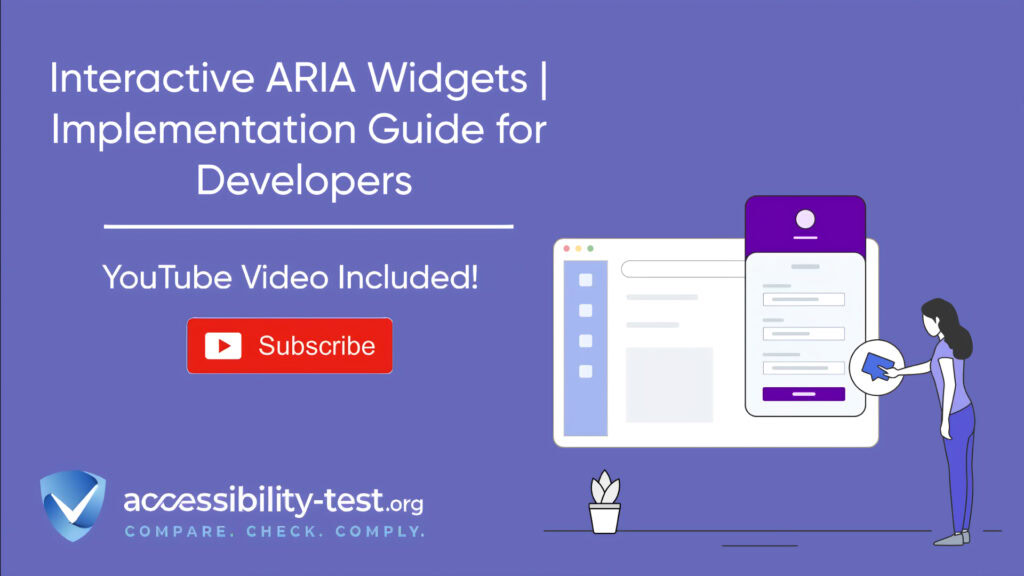
Cost-Benefit Analysis Across Certification Options
When comparing certification ROI, professionals must consider both direct costs and opportunity costs. The following analysis examines total investment requirements and potential returns for each option.
Direct Financial Investment Comparison
DHS Trusted Tester offers the strongest immediate ROI due to zero direct costs. Professionals invest only time, making it accessible regardless of financial situation. The certification provides practical skills and industry recognition without monetary barriers.
CPACC and WAS require significant upfront investment. For non-members, total costs including membership, exam fees, and study materials can exceed $800-900 for first-time certification. Members reduce this cost but still face $600-700 total investment when including preparation materials.
Time Investment Analysis
All three certifications require substantial time commitment. CPACC typically demands 6-8 weeks of part-time study, while DHS Trusted Tester requires 40-80 hours of intensive training. WAS preparation takes 8-12 weeks due to its technical complexity.
Time costs vary by professional situation. Senior professionals earning high salaries face greater opportunity costs for study time than entry-level candidates. However, the career advancement potential often justifies the investment for professionals at any level.
Long-Term Value Considerations
Certification maintenance requirements affect long-term ROI calculations. IAAP certifications require recertification every three years with 36 continuing education points and fees of $175 for members or $285 for non-members. DHS Trusted Tester doesn’t expire, eliminating ongoing costs.
IAAP membership adds $200 annually, which some professionals find difficult to justify beyond the initial certification period. Without membership, recertification costs increase significantly, affecting long-term value propositions.
Industry Recognition and Hiring Preferences
Certification value depends heavily on industry recognition and employer preferences. Different organizations prioritize different credentials based on their specific needs and regulatory requirements.
Government and Federal Contractor Preferences
Organizations working with federal agencies often prioritize DHS Trusted Tester certification due to its focus on Section 508 compliance. Government contractors frequently require or prefer this certification for team members performing accessibility testing on federal projects.
The practical testing skills emphasized in Trusted Tester training directly align with compliance verification needs in government environments. This creates strong demand for certified professionals in the federal contracting space.
Private Sector Recognition
Private sector organizations increasingly recognize IAAP certifications, particularly CPACC for management roles and WAS for technical positions. Universities report that hiring managers view IAAP certification as a differentiator when evaluating candidates.
The broader scope of IAAP certifications appeals to organizations needing professionals who understand both business strategy and technical implementation aspects of accessibility programs. This versatility creates value across multiple job functions within private companies.
Startup and Tech Company Preferences
Emerging technology companies often prefer candidates with practical skills over theoretical knowledge. DHS Trusted Tester’s hands-on approach appeals to these organizations, while WAS certification provides the technical depth needed for product development roles.
Many tech companies value professionals who can immediately contribute to accessibility testing and implementation rather than those who primarily understand policy and management aspects. This practical focus influences hiring decisions in fast-paced development environments.
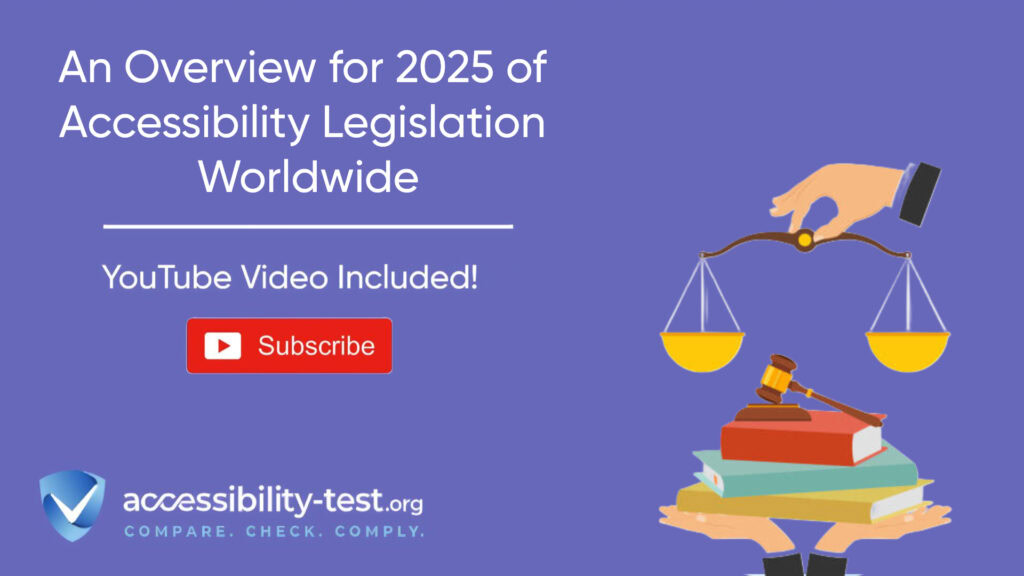
Organizational Benefits and Team Development
Organizations investing in team certification must consider both individual and collective benefits. Different certification approaches create varying organizational value propositions.
Building Internal Expertise
Organizations pursuing CPACC certification for multiple team members create internal accessibility expertise networks. Princeton University certified 21 staff members with CPACC designation, enabling them to establish leadership roles in their departments for accessibility matters.
This distributed expertise model prevents knowledge silos and creates organizational resilience. When accessibility knowledge exists across departments rather than in a centralized team, organizations can address accessibility concerns more effectively throughout the development process.
Compliance and Risk Management
DHS Trusted Tester certification helps organizations manage compliance risks, particularly in government contracting environments. Teams with certified testers can perform reliable Section 508 conformance assessments, reducing legal exposure and ensuring regulatory compliance.
The standardized testing methodology taught in Trusted Tester training creates consistency across team members and projects. This reliability benefits organizations needing predictable compliance verification processes.
Technical Team Development
WAS certification helps organizations build technical accessibility capabilities within their development teams. Certified developers can implement accessibility features correctly from the start, reducing remediation costs and improving product quality.
Organizations report that WAS-certified team members produce more consistent and higher-quality accessibility implementations. This improved quality reduces the need for external audits and remediation work, creating cost savings that justify the certification investment.
Real-World Professional Experiences
Professional experiences with different certifications provide valuable insights into practical benefits and challenges. These firsthand accounts help inform certification decisions.
CPACC Success Stories
Professionals report that CPACC certification significantly impacts their organizational credibility. One certificant noted: “Before I was a CPACC, to my peers, I was just another person talking about accessibility. Ever since I have obtained the certificate, people look towards me as the knowledge expert and the go to person in time of any crisis”.
This recognition creates opportunities for increased responsibilities and leadership roles. Organizations rely on certified professionals to guide accessibility initiatives and provide expert guidance on complex challenges.
DHS Trusted Tester Practical Benefits
Reddit discussions reveal strong satisfaction with DHS Trusted Tester training quality and practical applicability. Professionals consistently recommend the certification for its hands-on approach and comprehensive coverage of WCAG success criteria.
The practical exam format, requiring candidates to identify real accessibility issues, provides experience that translates directly to job responsibilities. Many professionals report feeling confident in their testing abilities immediately after certification.
Certification Stacking Strategies
Many professionals pursue multiple certifications to maximize career opportunities. The combination of DHS Trusted Tester for practical skills and CPACC for strategic knowledge creates well-rounded accessibility expertise.
Professionals holding both CPACC and WAS certifications receive the CPWA (Certified Professional in Web Accessibility) designation, representing the highest level of IAAP recognition. This combined credential demonstrates both strategic thinking and technical implementation capabilities.
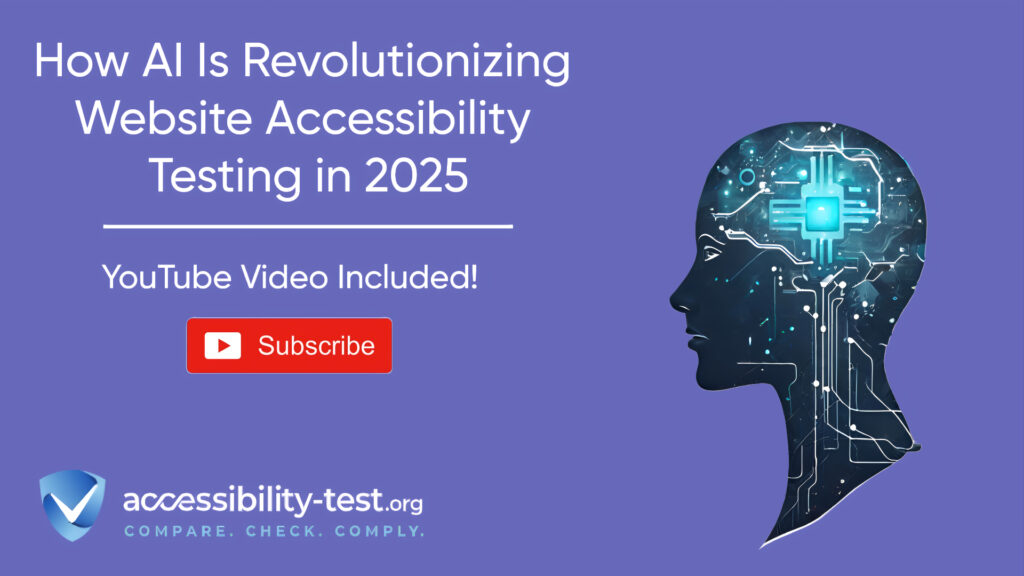
Future Certification Trends and Considerations
The accessibility certification field continues evolving as technology advances and regulatory requirements change. Understanding future trends helps professionals make informed long-term investment decisions.
Emerging Technology Integration
As artificial intelligence tools become more prevalent in accessibility testing, certification programs are adapting their curricula. Recent data suggests AI-enhanced testing capabilities now allow automated detection of up to 57% of accessibility issues by volume, with projections reaching nearly 70% by the end of 2025.
This technological advancement may influence future certification requirements, with programs potentially incorporating AI tool usage and interpretation of AI-generated accessibility reports. Professionals should consider how emerging tools might affect their certification choices and career development strategies.
Regulatory Evolution
European Accessibility Act enforcement beginning in June 2025 creates new compliance requirements for organizations selling products or services in EU markets. This regulatory expansion may influence certification value, particularly for programs addressing international standards and compliance frameworks.
Organizations operating globally increasingly need professionals who understand multiple regulatory frameworks beyond just WCAG or Section 508. This trend may favor certifications with broader international perspectives over those focused on specific national requirements.
Strategic Recommendations for Different Career Stages
Certification choices should align with career goals, current experience level, and organizational needs. The following recommendations help professionals select appropriate certification paths.
Entry-Level Professionals
New accessibility professionals should prioritize DHS Trusted Tester certification due to its zero cost and practical focus. The hands-on experience provides immediate job readiness while building foundational knowledge without financial risk.
After gaining confidence through Trusted Tester training, entry-level professionals can evaluate whether CPACC or WAS certification aligns with their career direction. The initial practical grounding helps inform future educational investments.
Mid-Career Professionals
Experienced professionals should consider their primary job responsibilities when selecting certifications. Those in management or strategic roles benefit most from CPACC certification, while technical professionals should pursue WAS certification.
Mid-career professionals often have organizational support for certification costs, making IAAP certifications more accessible. The investment in IAAP credentials can accelerate career advancement and increase earning potential.
Senior Professionals and Consultants
Senior professionals benefit from pursuing multiple certifications to demonstrate comprehensive expertise. The CPWA designation (requiring both CPACC and WAS) positions professionals for the highest-level opportunities in the field.
Consultants particularly benefit from recognized certifications as they provide credibility with new clients and justify premium rates. The investment in certification often pays for itself through increased billing rates and expanded client opportunities.
The accessibility certification market offers distinct value propositions for different professional situations. DHS Trusted Tester provides exceptional ROI through free, practical training that creates immediate job readiness. IAAP certifications require significant financial investment but offer broader industry recognition and strategic knowledge depth.
Using Automated Tools for Quick Insights (Accessibility-Test.org Scanner)
Automated testing tools provide a fast way to identify many common accessibility issues. They can quickly scan your website and point out problems that might be difficult for people with disabilities to overcome.
Visit Our Tools Comparison Page!

Run a FREE scan to check compliance and get recommendations to reduce risks of lawsuits
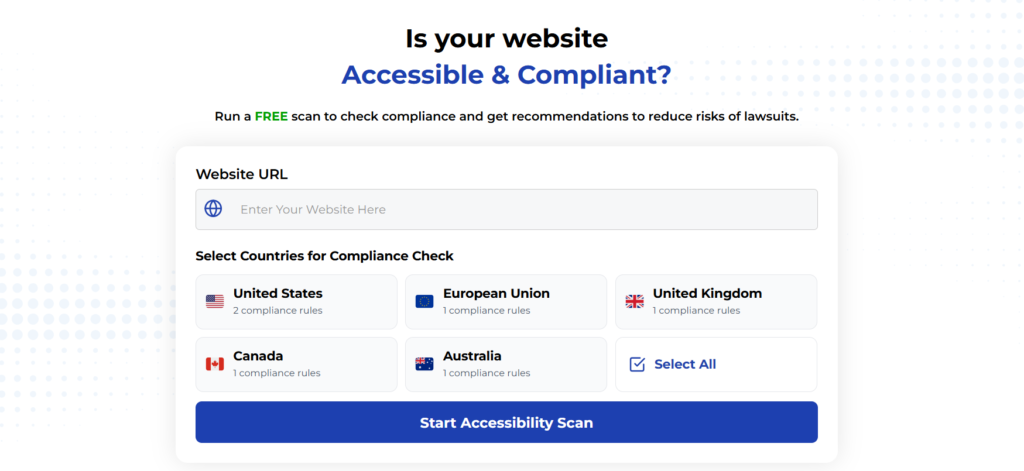
Final Thoughts
Professional success in accessibility requires both practical testing skills and strategic understanding of accessibility program management. The most successful professionals often pursue multiple certifications to build comprehensive expertise that serves diverse organizational needs.
Organizations investing in team certification should consider their specific compliance requirements, project types, and career development goals when selecting programs. The combination of individual professional advancement and organizational capability building creates the strongest return on certification investments.
As the accessibility field continues maturing and regulatory requirements expand globally, certified professionals will increasingly command premium opportunities and compensation. The investment in proper certification today positions professionals for long-term success in this growing and essential field.
Want More Help?
Try our free website accessibility scanner to identify heading structure issues and other accessibility problems on your site. Our tool provides clear recommendations for fixes that can be implemented quickly.
Join our community of developers committed to accessibility. Share your experiences, ask questions, and learn from others who are working to make the web more accessible.



